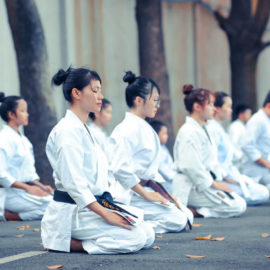
Are your relationships getting in the way of your self-improvement? How do you evaluate your relationships?
Sarah Knight argues that as an adult, you have a choice about who you spend your time with. She explains that in every relationship, you have three choices for how to move forward: Maintain the relationship, improve it, or end it.
Continue reading to decide what to do with the relationships in your life.
How to Maintain and Improve Relationships
According to Knight’s tips to evaluate your relationships, if you want to maintain or improve a relationship, you need to prioritize that relationship. This means making time for the people you care about. Make a plan to see the person, prioritize quality time with them, and then follow through on your commitment.
(Shortform note: In their book Eight Dates, relationship experts and real-life couple John Gottman and Julie Schwartz Gottman recommend implementing a weekly date night to prioritize and strengthen a romantic relationship. However, this concept can extend beyond romantic relationships and be applied to any valued relationship that you wish to prioritize. According to the Gottmans, relationships flourish when both individuals actively support each other’s growth and evolution, which involves dedicating intentional time for meaningful conversations and open-ended questions to continue learning about one another.)
But Knight also explains that prioritizing a relationship doesn’t have to mean flying halfway across the world to see someone. When it comes to relationships, a little can go a long way. Small daily kindnesses—such as a thoughtful text message or a handwritten card—can let someone know that they matter to you and often have a bigger impact than sporadic big gestures or gifts.
(Shortform note: Gottman and Schwartz Gottman introduce the idea of “bids” as a helpful framework to think about the power of small moments in improving relationships. A bid is any small moment when you seek attention, connection, or affirmation from another person. For example, if you reach for your partner’s hand as you’re walking down the street, that’s a bid. According to the Gottmans, responding to partners’, friends’, or family members’ bids in a positive and supportive manner plays a crucial role in prioritizing and strengthening the relationship.)
If you’re in a romantic relationship that you want to maintain or improve, Knight recommends using competition to fuel goodwill. The competition, according to Knight, is about who can be the best partner. Think about what kinds of things you can do for your partner, when you can do them, and then do them as often as possible. She says that this kind of friendly competition creates a cycle of goodwill that perpetuates positivity and mutual appreciation in the relationship.
(Shortform note: While using competition to fuel goodwill in a romantic relationship might sound like a promising idea, some therapists argue competition can be detrimental to relationships. Competition can create an environment of comparison and evaluation that undermines a healthy partnership. In a competitive mindset, partners may start focusing more on outdoing each other than on working together as a team. Furthermore, competition can lead to feelings of insecurity and self-doubt, especially if one partner constantly feels like they’re falling short.)
How to End a Relationship
If you don’t want to maintain or deepen a relationship, then it’s time to end it. According to Knight, there are two ways to end a relationship that isn’t healthy or that you’re not invested in. First, she explains, you can allow a relationship to disintegrate over time by not making it a priority. Second, you can also actively end a relationship. This is harder, but sometimes necessary if the relationship has become unhealthy or is no longer satisfying.
Knight further explains that ending a relationship is like any other big goal. To complete it, you need to break it down into smaller, more manageable steps. For example, if you’re breaking up with someone you live with or ending a marriage, the first step is a hard conversation. After that, there are likely logistical steps, like how to move out of a shared space or deciding who gets the dog, but each individual step is more manageable on its own than looking at the whole picture at once.
(Shortform note: If you’re ending an abusive relationship, experts recommend creating a safety plan and seeking support from trusted friends and family members. The University of Wisconsin-Madison School of Medicine and Public Health outlines practical steps. First, create a safety plan by identifying trusted individuals who can offer support and assistance. Second, gather important documents and belongings discreetly, including identification papers, financial documents, and any documentation of abuse. Finally, seek professional help from therapists, support groups, or helplines which can provide housing resources, emotional support, and legal advice.)
| Who Gets the Dog? In recent years, there has been a growing recognition of the emotional significance of pets and the deep bond that can develop between them and their owners. Many people now consider their pets to be members of the family. However, when couples separate or divorce, the question of who gets to keep the pet can become a challenging and emotionally charged issue. Traditionally, the legal system has treated pets as property, but there’s increasing awareness of the need to consider their welfare in custody arrangements. Shared “pet custody” is a viable option for couples going through a breakup. Couples can use verbal agreements, but there are also legal options like binding financial agreements or consent orders to determine pet custody. |






